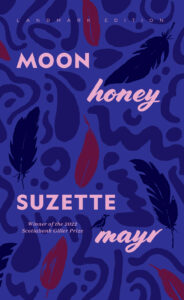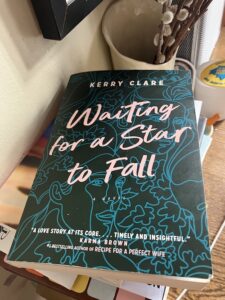February 27, 2025
Moon Honey, by Suzette Mayr
27 years before she won the Giller Prize for her novel The Sleeping Car Porter, Suzette Mayr released her debut novel, Moon Honey, a book that begins with a young white couple, Carmen and Griffin, having sex under a pool table in Griffin’s parents’ basement, the third time they’ve ever done it, and in the midst of things Carmen smacks her head on the table leg, passing out for about a minute, but Griffin doesn’t notice. Griffin doesn’t notice much, barely reacting at all when, not long after the pool table incident, Carmen is transformed into a Black woman, except to find the premise sexually exciting. His mother, Fran, on the other hand, who never liked Carmen in the first place, is almost relieved to have her virulent racism as a hook on which to hang her dislike for her son’s partner, but doesn’t have time to be comfortable there before she has her own transformation, part of a maternal legacy. Such metamorphoses punctuating the book—a bridesmaid who turns into a horse the bride rides out on, another bride who turns into a LITERAL asshole. Anything can happen in Moon Honey, limits to be pressed like luck, and the result is wild and rollicking magic. Out now in a brand new edition from from NeWest Press.
February 26, 2025
I Read My Own Book
Yesterday I read my own book, which is not something I’ve ever done before, with any of my books, cover to cover. It was in anticipation of tomorrow’s meeting of the Beyond a Ballot Book Club, which is reading WAITING FOR A STAR TO FALL, and I thought that I should probably reacquaint myself with the story, which came out almost five years ago. And I’m glad I did, first because there was indeed so much of the story I’d forgotten (her roommate Lauren! I love her!), which would have made me the most useless guest author ever, but also because I really enjoyed the book. Like, ridiculously enjoyed it, which I guess makes sense since I wrote it, and therefore it would indeed so viscerally tap into my emotions, but I wasn’t expecting to feel it so much. While most what my main character experiences in this book is not based on my own life, I’d drawn on my own post-adolescent feelings of longing and sad-hoping to realize her character, and so reading it really did affect me in a really stirring way.
I was also glad to enjoy the book so much because of how it was a novel that wasn’t received the way I’d expected it to be by readers. Part of it was the marketing, I think, which positioned the novel as a straightforward romance, which it’s not, but I’d come away with some regret that perhaps I’d been too ambiguous in my approach to the story. This is very much a #MeToo novel, but I wanted to write about the grey areas surrounding that issue, which is not to say that I’m ambivalent about consent, and rape culture, and unequal power dynamics, and how some men get away with everything while women are torn down so easily, but I found it really interesting to think about a workplace relationship from the point of view of someone who thinks she has more power than she does, about what it means when some women choose the side of the oppressor, about being sure of yourself when you’re too young to really know (and how patronizing is that) and how all these ideas that really do muddy the water.
However there were people who read this book and thought I’d written an anti-feminist screed, and there were even people who congratulated me for my bravery in writing an anti-feminist screed (YIKES!). To which I say, we all bring our own baggage and biases to every book we pick up, but it sure made me think that avoiding ambiguity might actually be advised, and that the reading public might in fact require clear and direct messaging instead of broad spaces to think around in. (I don’t REALLY think that, but I also don’t want people thinking I’ve writing a novel in defence of predatory men!).
But I was pleased to read the book just like a reader, instead of as the writer I’d been when I’d read it so many times pre-publication in draft form, and to discover that I really do think I got it just right, and if not everyone got it, well, so be it. But I was pleased with what a thoughtful, nuanced, and subtle story this is, which is what I think that a novel operating in a grey area has to be.
So weird to be reading this novel about politics in such a different political environment from the one that I wrote it in though, sheesh. The book is absolutely fictional, but was inspired by a politician whose downfall made way for our current Ontario premier, who has been such a disaster and who is predicted to win his third straight majority when we go to the polls tomorrow. (Does this make me think differently about the other smarmy guy who we could have had instead? Not really. And don’t worry, after that scandal that “ruined his life,” he did manage to be elected mayor of a city he hadn’t even lived in. These guys do okay…) I also wrote this novel in 2017/2018, when the new US presidency seemed like a blip, a fluke, and everything is so much more awful now. Even worse, my novel features excerpts from made up news articles/opinion pieces and the one by a female right-wing tabloid columnist that was supposed to be paranoid and crazy—about how #MeToo was going to generate a backlash that made broken men absolutely dangerous, “you ain’t seen toxic masculinity yet”—reads as horrifyingly prescient.
February 25, 2025
February Essay: In the Air Tonight
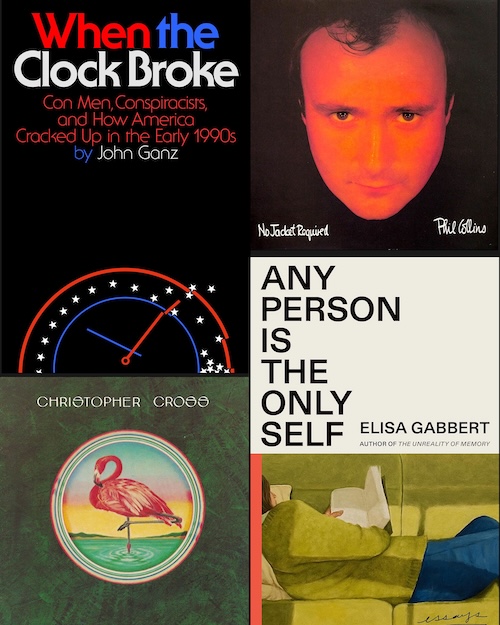
The week after the US election, I was talking to my therapist about fathers. Not my father, but fathers in general, and about the avuncular manager at the grocery store whom I’d encountered in the bread aisle with an expression of concern on his face because there had been a widespread recall. Another widespread recall, after the one not long before it that had me tossing my fancy $5 ancient grains loaf into the garbage because it might be contaminated with metal fragments, just one more thing that made it feel like the world was going to shit, like nobody normal was in charge.
“Do you know what’s going on with this?” I asked the grocery store manager, who looked up from his clipboard shaking his head, but not despairingly. It’s just a lot, managing a grocery store, even at the best of times, and these are not that. He explained that my preferred loaf was not affected by this recall, and I said I wanted to be sure. Mainly I just wanted to keep talking to him, because of the authority of his clipboard, and how he reminded me of the actor Richard Kind.
“Basically,” I told my therapist, the revelation dawning. “I wanted the grocery store manager to be my dad.”
And with that, I finally realized why, in the wake of an election that was upending the world order, I was yammering on about ancient grains and grocery stores, and I also understood the one thing I might have in common with voters who were celebrating the election result instead of mourning it.
It was all about dads, about clipboards and pressed shirts, about order and authority, and the the promise of a person (a man person) who could tell you, and even mean it, that everything was going to be all right.
(Read the rest at Substack. If you’re a long-time blog reader, I would be happy to send you a complimentary paid subscription. Drop me a line and let me know.)
February 21, 2025
Anastasia Krupnik

My family is reading The Iliad aloud (turns out we’re Homer completists; after reading Emily Wilson’s The Odyssey a few years back, it only seemed natural) but nobody is enjoying it. It’s as boring, bloody, and stagnate as the Trojan War, and then when my kids found out the horse wasn’t even in it, they were furious. I’m not ready to give up on The Iliad yet, however, and so we’re interspersing its books with lighter and more satisfying fare, which most recently was Lois Lowry’s novel Anastasia Krupnik, the first title in her series about the quirky daughter of a poet and a painter growing up in Cambridge, Massachusetts.
I bought an Anastasia boxed set for my children a few years ago (tragically, does not currently seem available!), and while we’ve since read Books 2-4 all aloud and absolutely loved them, I hadn’t read them the first book yet—it’s a bit different, set when Anastasia was only 10, before she moved into her tower bedroom in the suburbs and her little brother, Sam, was born. In my mind it was more idiosyncratic than the other titles, and maybe that’s true, but now I’m not sure why I held back at all, because it’s just as great, maybe even more so, and it turns out it might also be my own personal urtext.

There were so many things in this book that I thought were MY things. Like when Anastasia (when she’s going through her wanting to be Catholic stage) makes the sign of the cross while thinking to herself “Forehead. Belly button. Left nipple. Right nipple.” And having a beloved wart. (RIP the wart on my finger that fell of when I was 24.) Being a list-maker. And maybe even living in the kind of household where children do precocious things like be read The Iliad (which doesn’t happen in this book, but I feel like it could…)
February 19, 2025
Gleanings

- What caretaking teaches us is that there is no grand or permanent utopia, only tiny, fleeting, and intimate ones
- i am saturated in colour, the rosy or yellow or sky blue buildings, the cup I bring back from the market, filled with pineapple and mango, dusted with chile, the houses tumbling down the hills above Oaxaca, red, pink, emerald green.
- wish i could teach the value of small things to other people. there has to be a crack somewhere so i can get in, so i can show this. just a sliver.
- One of our regular big-order customers comes to pick up six hardbacks, which means the pressure is off for the rest of the day because that sort of sale is more than I might take the whole day. This is less a comment about what a great sale it was, and more a comment on how modest our takings are.
- But words — they’re not hard, not to me. They’re malleable and slippery and musical. They are the material of play — or one of the materials, and one of my most reliable. We dance together. Words dart under the surface and burst through it, carrying an image, a roar, a need.
- So why bring up uncertainty? Because in Victorian Women Writers this week we are finishing up our work on Villette, and more than once in class I have acknowledged my own uncertainty about what exactly is going on in this strange, brooding, gripping novel.
- I’m trying to bring gentleness into my interactions with loved ones and strangers as a kind of resistance to brutality.
- And so, if you find yourself spinning, wondering what more you can do beyond donating to a cause or contacting your government representative, here’s a little primer to get you started…
- What can you say about a famous 1970 novel, that nowadays gets remembered more for its nostalgic fashion than literary merit? That it was brief. That it was stocked with characters from central casting. That it made everyone cry. Including me, many times.
February 18, 2025
Slow Horses, by Mick Herron

Twice in the past 24 hours, the first time with a stranger while riding the subway and the second with my doctor while I was having an ultrasound on my neck, have I found myself enthusing about Slow Horses, the mystery series by Mick Herron that’s been turned into an acclaimed series on Apple TV, and about how the character played by Gary Oldman in the show (Jackson Lamb) is always farting. I absolutely love this in our age of fragmented culture, and wonder who I’ll be discussion Lamb’s flatulence with tomorrow.
Possibly I’m failing to impress upon you how good these books are…
Unlike those I was talking to, I haven’t seen the show, but did spend a cozy snowstorm long weekend with the first book in the series, which I loved. (My husband is currently reading Dead Lions, the second book, and he’s enjoying that one too.) It’s a novel about spies whose mistakes and misadventures have sent them to Slough House, the place where misfit MI5 agents go to die (and hence the name for them, the Slow Horses)…until a high profile kidnapping case ends up in their lap. Jackson Lamb is their most uninspiring boss whose faith in them is nil. And yet.
What struck me most about Slow Horses—in addition to it being quite gripping—was its prescience. Published in 2010, and including a narrative thread about a Boris Johnson-esque figure with his eye on Number 10, the idea of far-right racist views being held by mainstream figures might have seemed far fetched at the time, but not so much now. After a massive cock-up, Slow Horse River Cartwright has only managed to stay in MI5 because of his grandfather, a former agent, who, when the two are discussing a journalist exposed for gross racist and nationalist views, explains to him that “[the journalist] wasn’t excommunicated because of his beliefs. It was because there are certain beliefs you’re supposed to keep under wraps if you want to dine at the High Table.” Which, in light of the capitulation of so many (powerful) people to the current US administration’s terrifying authoritarian agenda, seems awfully true, and they’re not even hiding anymore.
February 16, 2025
How We Learn to Be Brave, by Mariann Edgar Budde

This is a really beautiful book, so rich, honest, and generous. I bought it as a gesture of support and solidarity, but wasn’t sure—as someone without religion—how much I’d connect with it, but I appreciated its lessons so much and found them really buoying.
February 12, 2025
The Box Garden, by Carol Shields

Expectations weren’t huge for my reread of Carol Shields’ sophomore novel, THE BOX GARDEN. As I mentioned in my January essay about my 2025 reading projects (rereading the works of Carol Shields is one of them!), I recalled her noting somewhere that she regretted the overwrought plotting of the book (there is a high stakes element near the end that seems incongruous with the tension of the rest of the novel). I’d also been underwhelmed upon my most recent read of her first novel, SMALL CEREMONIES, which I’d really admired when I first read it a while back, but whose plot is almost UNDERwrought, its flimsiness apparent as I now knew all the twists and turns and there was not much to the story that was left after that (except that this is a Carol Shields, book, so even the dust motes are magic, which I need to say, because strangers keep leaving scolding comments admonishing me for my audacity to critique the works of beloved writers. I will add that part of really loving a writer and engaging with their work is reading with a clear eye, being able to understand what works and what doesn’t, and also it’s just a more interesting way for me to read.)
The Box Garden made no impression on me when I read it before. A search on my blog reveals that I never wrote about it, except for a reference to a review by Barbara Amiel who’d said that this book and others like it, with their focuses on the lives of ordinary people, “will be the undoing of contemporary literature,” and—as she was about many things—Barbara Amiel was wrong about that. I suspect that this story—about a woman approaching her forties, considering her divorce, single motherhood, reflecting on her relationship with her own mother as she travels from her home in Vancouver to her mother’s suburban bungalow in Scarborough, Ontario, for her mother’s unexpected wedding, thinking about mid-life, about old age—didn’t resonate with me when I was younger and didn’t properly understand how many lives a life contains, but I get it now. The mystery of how we got from there to here, Shields’ Charleen seemingly untethered from the many selves she’s been, but needing to get them all into some kind of order if she’s ever going to be ready to move forward with her life. An ordinary life is always an odyssey.
There’s also an uncanny bit of prescience in the novel, the book’s title coming from a box that Charleen receives from a somewhat mystical correspondent containing a tray, a bag of earth, and some grass seed. According to the Merriam-Webster dictionary, the first known use of the expression “touch grass” was in 2016, an expression that’s about connecting with a tangible reality (as opposed to being on the internet), but in 1977, Shields was writing about it literally: “I…like to run my hand over its springy tightly-shaved surface, loving its tufted healthy carpet-thick threads, the way it struggles against the sides of the box, the industry with which it mends itself,” and the man who’d sent the package had been writing about the sociology of grass, he had “a theory about the importance of grass to human happiness.”
The reader is meant to find the entire project a little bit out-there, but there is also something to it, which Carol Shields always knew, even if Barbara Amiel didn’t. That life (and even literature) can be about the small scale, about the details, about the wonder inherent in something as simple as grass, regarded blade by blade
February 11, 2025
Crowded Rooms Full of Happy People Doing Inconsequential Things
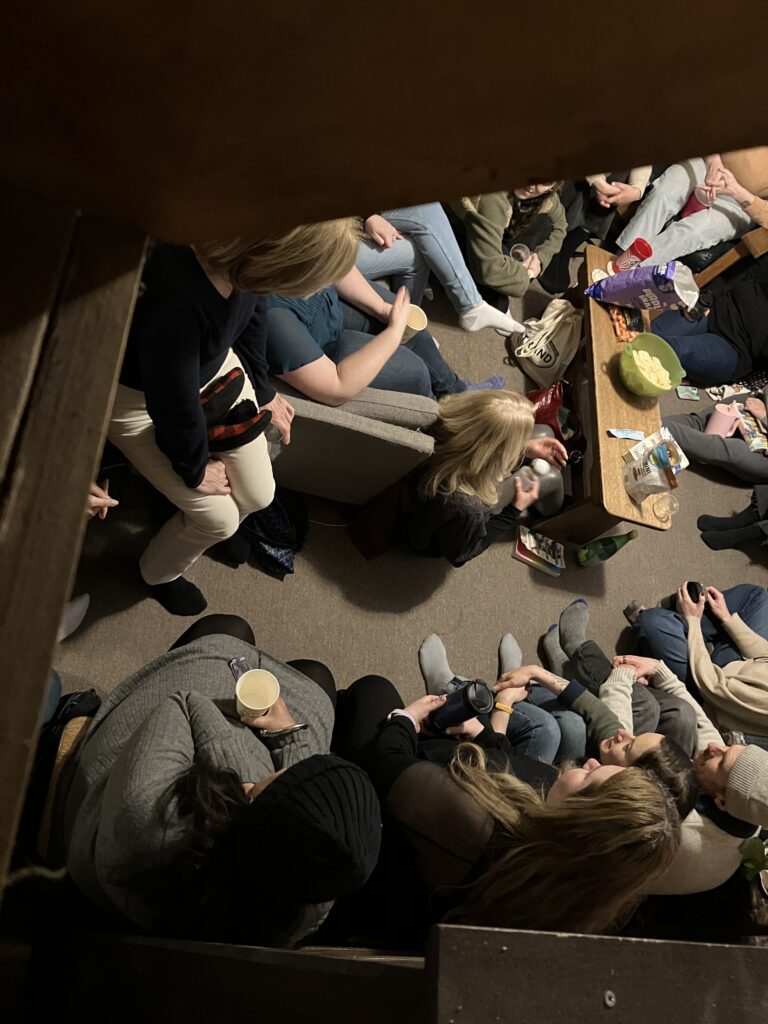
My most recent ENTHUSIASMS newsletter went out this morning without caveats or apologies for enthusing at a moment when so many things in the world are terrible, for the simple reason that enthusing is one of my deliberate non-reactive responses to “all this,” along with another of my great pleasures lately: gathering in crowded rooms with happy people taking part in activities of little consequence.
Gathering in crowded rooms with happy people taking part in activities of little consequence, to me, is not just an antidote to our precarious current moment, but also to the last five years, during which crowded rooms and crowds in general have often felt threatening, sometimes enough to put me off people in general, contempt breeding contempt. But I can’t have that, because it only turns me into a monster, a mirror image of the forces I rise against, so instead, I am reacquainting myself with community and connection, all the while also bringing a fresh awareness of boundaries that I didn’t used to have, which previously made things like community and connection into an awful kind of trap. (Other people are not required to love me. WHO KNEW? And I don’t have to love everyone: ALSO TOTALLY FINE. WHAAA?)
All this is not to denigrate gatherings of people taking part in activities of GREAT consequence (for example, we have an election coming up on Ontario at the end of this month; make sure you’re registered to vote!) but I actually think these inconsequential activities matter just as much. (It matters too for me not to be gathering in rooms crowded with angry people. Rage is not the fuel I need right now, and this world has enough of it already.)
So I’ve been working hard at showing up, at gatherings large and small. I’ve been inviting my neighbours for dinner and reaching out and making plans with friends I haven’t seen in too long. I’ve been making an effort to get out into the world, and be with people, even anonymously (sitting with a book and a cup of tea in a crowded cafe) to repair the tears in my own sense of the social fabric, which can’t help but go some way towards repairing that sense in others, even though I’m not even responsible for that. I’m really only responsible for me, and knowing that makes the entire project so much easier.
I want to live in a world where I trust people, where I welcome people, where I can have thoughtful disagreements with people, where I learn from people, where I am content to let people think otherwise, where I can be wrong, where other people can be wrong, where there is room enough for all kinds of different voices in all kinds of different keys.
Often literally—I’ve been in rooms singing along with strangers in a variety of different contexts lately, and I love this, that we’re making harmony, which is pretty much our job here as beings on this planet earth. But in more abstract ways as well—even riding the subway, I look around and consider what a miracle this arrangement is, all of us together, strangers in a tin can hurtling through the darkness, minding each other’s business, even ignoring each other, which is an undervalued part of city life, if you ask me.
You be you, and I’ll be me, which is also a kind of mercy.
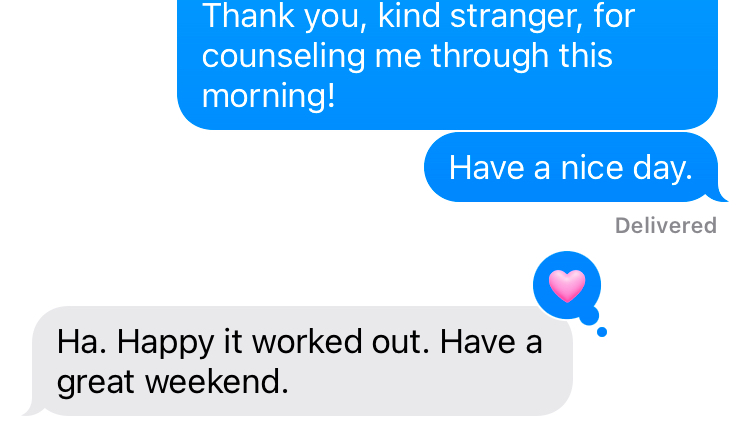
*
This message was part of my February newsletter. To receive the Pickle Me This Digest in your inbox every month, sign up today!
February 9, 2025
My Story on the ABORSH Podcast
Thank you, Rachel Cairns, for making my abortion story part of Season Two of the Aborsh Podcast. You can listen on Spotify or Apple Podcasts, or wherever you get your podcasts.
